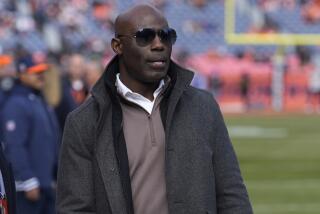A Flight of Fancy Becomes a Sober Ride
Three decades ago, a girl of 12 read a book about stewardesses and became enamored. She wanted to be one of those freewheeling, high-flying stews.
Eighteen years of hard work in the skies dissolved some of the “Coffee, Tea or Me” dreams of Jillian McNary’s youth and forged a mature flight attendant. The smoke and ashes of Sept. 11 provided the final burial of the stewardess image.
Passengers have recognized the transformation since the terrorist attacks. Even the most recalcitrant seem to have figured out that the men and women working the aisles are “not just someone who serves them coffee,” says McNary, who has spent her entire career with American Airlines.
Every day in the sky presents a new challenge in patience, ingenuity, diplomacy and resolve. Of all aboard, only the flight attendants and crew have an obligation to keep their wants and emotions in check.
Her first time in the air after the attacks, McNary broke some bad news to jittery passengers: “Although we have some wonderful wines on board, I have no way of opening them.”
Flight attendants had been ordered not to bring corkscrews. But a passenger volunteered his services, saying he knew an old trick from college. So McNary lined up wine bottles on his tray. One by one, he pushed the corks through with his thumbs. She poured.
And the passengers on that overbooked flight to New York--many returning home after being stranded for days--relaxed just a little.
A week later, McNary was on a Los Angeles-bound jumbo jet when a young Middle Eastern man slid a large jug under the seat in front of him.
McNary asked what was in the container. He said water. She told him there was plenty of water on board. He responded: “It’s holy water.”
The man argued that the gate agent had already forced him to take a swig of the liquid to prove it was benign. That wasn’t good enough for McNary, who decided a suicide bomber wouldn’t hesitate to drink a little explosive liquid.
“I’m sorry to tell you this, but your holy water can’t go,” she told the young man. “If you need to stay with your holy water, you’re going to have to get off the aircraft as well.”
The passenger handed the bottle to her without argument.
Every time equilibrium threatens to return, there’s one of those moments.
A pilot pulls McNary and her colleagues aside and tells them what to do if a hijacker threatens their plane: Call the cockpit and say the code word. Then brace, or buckle in.
Then, the pilot informs them, “I’ll do what I need to do to the aircraft to put someone on their heinie.”
In between the life-and-death strategies, there are passengers in the anthrax-anxious era who have other concerns. Why can’t they get artificial sweetener? Why only sugar on board?
“Sugar isn’t powdery like Sweet ‘N Low,” McNary explains evenly. “It’s made up of granules.”
Her patience tested but seldom broken, McNary still gets a charge out of working at 35,000 feet. The 42-year-old mother of two won’t hear of suggestions from family and friends that she quit.
“This job gets in your blood,” she says. “No one becomes a flight attendant for the wages.”
Still, McNary cries when she thinks about colleagues who died in the attacks or sees pictures of an American flag or a fatherless child on television.
Professionally consumed with the care of others, she tends to forget to nurture herself. So when American Airlines Flight 587 crashes in Queens in mid-November, killing everyone aboard, it hits her hard. As she straps in that day to fly home from New York to Los Angeles, she feels something she never has before: anxiety. She realizes that she finally needs a break.
“They say lightning doesn’t strike twice--well, it has. And things happen in threes,” she says during a conversation at LAX’s Terminal 4 recently, contemplating a short leave. “I’m thinking I’m not going to fly anymore for a while.”
More to Read
Sign up for The Wild
We’ll help you find the best places to hike, bike and run, as well as the perfect silent spots for meditation and yoga.
You may occasionally receive promotional content from the Los Angeles Times.







